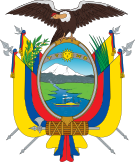
The politics of Ecuador are multi-party. The central government polity is a quadrennially elected presidential, unicameral representative democracy. The President of Ecuador is head of state and head of the army on a multi-party system, and leads a cabinet with further executive power. Legislative power is not limited to the National Assembly, as it may to a lesser degree be exercised by the executive which consists of the President convening an appointed executive cabinet. Subsequent acts of the National Assembly are supreme over Executive Orders where sufficient votes have been cast by the legislators. The judiciary is independent of the executive and the legislature. Ecuador is also considered a constitutional republic.

The Democratic Left is a social-democratic political party in Ecuador. It was founded in 1970 by the then congressman Rodrigo Borja Cevallos.

Lenín Boltaire Moreno Garcés is an Ecuadorian politician who served as the 46th president of Ecuador, from 2017 to 2021. Moreno was vice president from 2007 to 2013, serving under President Rafael Correa.

The Revolutionary and Democratic Ethical Green Movement (MOVER, Spanish: Movimiento Verde Ético Revolucionario y Democrático) is a centre to centre-right neoliberal political party in Ecuador. In 2016, it had 979,691 members. Until 2021 it was known as the PAIS Alliance (Proud and Sovereign Homeland) (PAIS, Spanish: Alianza PAIS (Patria Altiva i Soberana)).

Creating Opportunities is a centre-right political party in Ecuador. In the 2021 general election, its leader, Guillermo Lasso was elected for president.

Guillermo Alberto Santiago Lasso Mendoza is an Ecuadorian businessman, banker and politician who served as the 47th president of Ecuador from 2021 to 2023. He was the country's first conservative president in nearly two decades, marking a shift in the country's electorate.

The conservative wave, or blue tide, was a right-wing political phenomenon that occurred in the mid-2010s to the early 2020s in Latin America as a direct reaction to the pink tide. During the conservative wave, left-wing governments suffered their first major electoral losses in a decade. In Argentina, Mauricio Macri succeeded Cristina Fernández de Kirchner (Peronist) in 2015. In Brazil, the impeachment of Dilma Rousseff, a socialist, resulted in her departure and the rise of Vice President Michel Temer to power in 2016, and later to far-right congressman Jair Bolsonaro becoming President of Brazil. In Peru, the conservative economist Pedro Pablo Kuczynski succeeded Ollanta Humala, a socialist and left-wing nationalist. In Chile, the conservative Sebastián Piñera succeeded Michelle Bachelet, a social democrat, in 2018 in the same transition that occurred in 2010. In Bolivia, the conservative Jeanine Áñez succeeded Evo Morales amid the 2019 Bolivian political crisis. In Ecuador, the centre-right conservative banker Guillermo Lasso succeeded the deeply unpopular Lenín Moreno, becoming the first right-wing President of Ecuador in 14 years.

The Citizen Revolution Movement is a democratic socialist political party in Ecuador formed by supporters of former President Rafael Correa who distanced themselves from Correa's former PAIS Alliance party during the presidency of Lenín Moreno. The party takes its name from the term used to refer to the project of building a new society.

Andrés Arauz Galarza is an Ecuadorian politician and economist who ran for Vice President of Ecuador in the 2023 election. Arauz served as Minister of Knowledge and Human Talent in the Rafael Correa administration from 2015 to 2017. He also briefly served as President of the Citizen Revolution Movement from five months between December 2020 to May 2021.

General elections were held in Ecuador on 7 February 2021, established by the National Electoral Council (CNE) as the date for the first round of the presidential election and a vote on mining in Cuenca. Incumbent president Lenín Moreno, who had held the office since his victory over Guillermo Lasso in 2017, did not seek reelection. Although delaying the election due to the COVID-19 pandemic was discussed, the CNE announced on 15 December 2020 that the electoral calendar would not shift and confirmed elections would take place in February 2021.
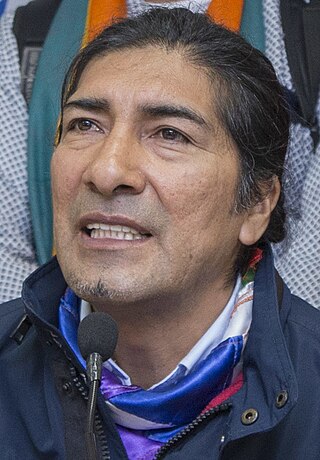
Yaku Sacha Pérez Guartambel, often simply known as Yaku Pérez, is an Ecuadorian politician and indigenous rights, human rights, and nature's rights activist, who ran for president of the country in the 2021 presidential elections and came third in the first round. He ran for president again in the 2023 elections.
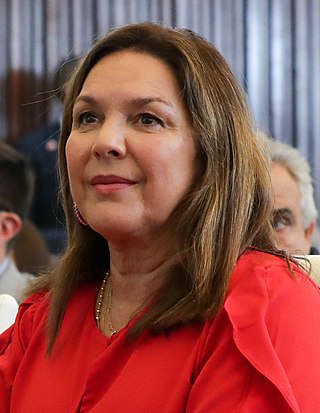
Maria de Lourdes Alcívar Crespo is an Ecuadorian socialite, who was the First Lady of Ecuador from 24 May 2021 to 23 November 2023, as the wife of former President Guillermo Lasso. She was seen as a "key female figure" of the Creating Opportunities party.

Snap general elections were held in Ecuador on 20 August 2023 to vote for President of Ecuador, members of the National Assembly and two referendums. Elections followed the invocation of muerte cruzada, which dissolved the National Assembly on 17 May 2023. A run-off election was held on 15 October 2023 to elect the President after candidates were unable to reach the threshold needed to win in the first round. Incumbent president Guillermo Lasso was eligible for a second term, but he announced on 18 May that he would not stand for re-election in response to his impeachment.
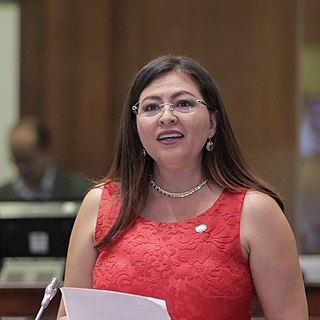
Sofía Eugenia Espín Reyes is an Ecuadorian politician. After she was dismissed from the National Assembly she fled to Bolivia, where she applied for political asylum. Before this was resolved she was re-elected in May 2021. Espín was the president of the political coalition called Union for Hope.
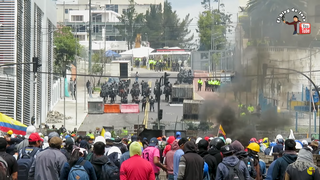
A series of protests against the economic policies of Ecuadorian president Guillermo Lasso, triggered by increasing fuel and food prices, began on 13 June 2022. Initiated by and primarily attended by Indigenous activists, in particular the Confederation of Indigenous Nationalities of Ecuador (CONAIE), the protests have since been joined by students and workers who have also been affected by the price increases. Lasso condemned the protests and labelled them as an attempted "coup d'état" against his government.

Events in the year 2023 in Ecuador.

The 2023 Ecuadorian local elections were held on 5 February 2023, alongside the 2023 Ecuadorian constitutional referendum. These elections determined 23 prefects, 23 vice-prefects, 221 mayors, 868 urban councilors, 437 rural councilors, and 4,084 principal members of the parish councils. The previous elections were held in 2019.
On 4 February 2023, Omar Menéndez, a 41-year-old Ecuadorian man who was running as the Citizen Revolution Movement party's candidate for mayor in the canton of Puerto López, Manabí Province in the 2023 Ecuadorian local elections, was shot and killed by two unidentified men just a few hours before the ballots were officially opened. Three other people were injured in the same shooting, including a 16-year-old volunteer, who eventually died from complications after being taken to the hospital.
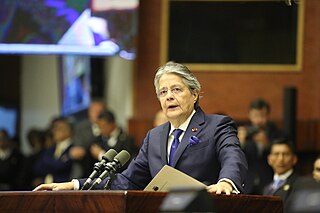
A political crisis began in Ecuador on 17 May 2023 as a result of the impeachment trial against President Guillermo Lasso. The impeachment inquiry began in the National Assembly on 9 May and lasted until 17 May when Lasso dissolved parliament through the constitutional provision known as muerte cruzada. That triggered the end of the impeachment inquiry as it dissolved the National Assembly and caused an earlier general election. The mutual dissolution marks the first time this constitutional measure has been triggered by an Ecuadorian president.

A referendum on banning oil exploitation in the Yasuní National Park was held in Ecuador on 20 August 2023 alongside general elections. If the proposal was accepted, a progressive withdrawal of all activities related to oil extraction would occur within one year from the announcement of the official results, and the state would not be able to take action intending to initiate new contracts to continue oil exploration in the block. The referendum was a popular initiative demanded by indigenous communities for more than ten years before being finally validated by the Constitutional Court in May 2023.
